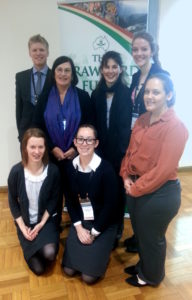
2014 Young Scholar: Aaron Preston

Front: Julia de Bruyn, Katherine Ashley, Kirsty McCormack
Aaron Preston
Charles Sturt University
Sponsored by the NSW Committee
Aaron is a PhD student at Charles Sturt University investigating the genetic resistances to commercial herbicides of Australia’s most economically damaging crop weed (Lolium rigidum), and developing a novel approach to identify weeds for their management. In May 2014 he received funding from the Crawford Fund to attend the IRRI rice production course in Los Baños, Philippines. There, he was exposed to some of the differences and challenges of agriculture from around the world. He also had the opportunity to interact with farmers from the remote Ifugao rice terraces of Banaue and gained valuable insight into the difficulties they face. By interviewing farmers and researchers, he developed a great appreciation for the tremendous hurdle of communicating research from the laboratory to extension officers through to farmers and vice versa. He is attending the Crawford Fund conference to develop an understanding of ways he might contribute to alleviating some of these problems.
Conference report
I immensely appreciated the opportunity to liaise, network and interact with senior scientists, industry leaders and students. The open nature of the conference allowed for, and encouraged, direct interaction of all the attendees.”
The Crawford conference was an exciting and wonderful experience. I immensely appreciated the opportunity to liaise, network and interact with senior scientists, industry leaders and students. The open nature of the conference allowed for, and encouraged, direct interaction of all the attendees. This was particularly evident during the conference dinner. Although somewhat unconventional, the open design of the dinner encouraged a free-flowing nature, which participants readily adapted to. This encouraged more interaction with a variety of people. I was able to interact with all the available young scholars, the co-ordinators and a number of other attendees.
The parliamentary conference presentations were very well received and provided an interesting update on the state of global trends in population growth, food demand and food security. The shared focal point of the topics did result in some redundant overlap from the presenters, although this did serve to drive home some of the import facts. I give special mention to Dr Shenggen Fan (IFPRI), Mr Luke Chandler (Rabobank) and Prof Catherine Bertini for their interesting and thought provoking presentations. All the presenters did a wonderful job at identifying the challenges of nutritiously feeding a growing world. It would be interesting for future presentations to have a greater focus in the development of solutions and their implementation, as well as the results of this work.
After the conference I attended the informal dinner organised by RAID (Researchers in Agriculture for International Development). RAID was formed to connect, support and encourage mid-career agricultural scientists to research that assists in international development. During this event I spoke with Jack Koci and David McGill and we discussed how to link RAID and the Charles Sturt University Postgraduate group, of which I am a coordinator. Our resolution is to hold a joint meeting in October with our members to raise awareness for RAID and to encourage our members to join the network.
The final event of the conference was the scholar day. This was another opportunity to network with the other students, and was a great chance to interact more closely with senior Crawford members. After this I was given an opportunity to speak briefly about my experience working overseas at IRRI. This was a rewarding experience as I was approached by multiple undergraduate students with questions about my experience and how to get involved. I was particularly impressed with the other RAID presenters and the presentations from Jonathan Marshall and Catherine Bertini. Jonathan provided a novel way of training using a specially developed game, and Catherine provided a frank Q and A about some of the ins and outs of the work within the UN and the WFP.
All in all, attending the Crawford Fund conference allowed for greater interaction with stakeholders in international development and provided an overview of the importance of continuing international agricultural research. The conference provided a wonderful opportunity to network with other early career researchers (RAID, scholars) and more experienced members (Crawford fund members, industry stakeholders etc). I would wholeheartedly encourage anyone with interest in international agricultural development to attend.
